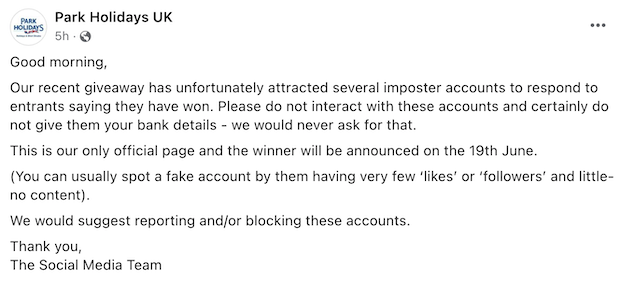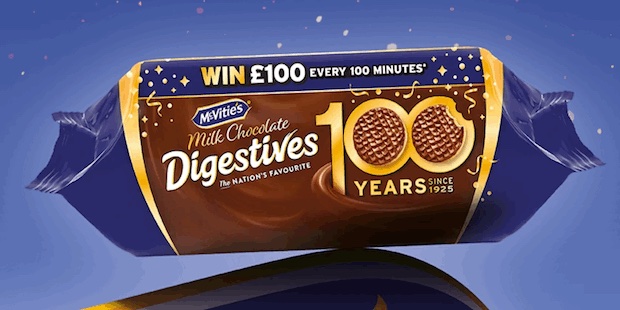You should upgrade or use an alternative browser.
Can Facebook Stop Fake Competition Pages?
- Start date
-
- Site or Brand Name Tag
- competition scams facebook comping

Prize draws on social media are incredibly popular simply because they're easy to set up and often easy to run. There's no need for competition landing pages, databases, fancy graphics etc that come with putting a giveaway on a website. It's a dream world for brands who are looking for quick wins when it comes to user engagement and building follower numbers. However what should be a relatively simple process has become a nightmare for many brands. Pretty much for every organisation trying to run a giveaway on either Instagram or Facebook there's a bunch of scammers ready to pounce. Scammers create pages with similar names as the prize giving brand and try and target entrants with direct messages. Entrants may be duped into thinking that they've won a prize but may have to pay to receive it, or they may be asked for personal details including financials which can lead to them being scammed. For example, Park Holidays, who at time of writing are giving away a Short Break, posted the following to their Facebook page:

You Have Won! But You Haven't!
This kind of thing isn't new but it seems that Meta, the name of the company that owns both Instagram and Facebook, have zero interest in figuring out any kind of solution. Surely by now their amazing system which can spot a comper entering more than two giveaways in a minute during advent season can come up with some kind of sensible solution. For a company which makes billions on data mining there must be an easy way for them to spot which countries and IP addresses where these fake accounts are originating. They must be able to determine the modus operandi and stop them before they're even able to target entrants. It beggars belief that every time a brand runs a prize draw on social media that it attracts these problems. Fortunately many brands are on the ball and make it clear that they will only notify winners in a specific way and via official channels. However a well created "you have won" post can still catch out people who perhaps might be off guard or genuinely believe that they're being contacted by the official brand. Fortunately the messages aren't always well created and contain spelling errors and links that aren't related to the brand. In addition the scammers tend to start sending messages during the promotional period so you can't be a winner if the prize draw is still running. If you receive a message on Insta or Facebook that you're unsure about then just check the account it originates from. And never ever give your bank details! No prize winning communication would ask for these details.
What Could Facebook Do Better?
Unfortunately scam accounts will always be part of the make-up of social media. Making people aware that they exist is one way of improving the scenario but we still see people liking/sharing stupid things like "we have a campervan that hasn't be picked up by a customer so we're giving it away". Authentication is one area which could help make the process better. Well established brands have blue ticks which help users recognised that their page is official. Therefore is you go to Argos then you'll see a blue tick and know it's the page for Argos. If you subsequently get a message from say Argos UK then you should know for sure it's not official. Park Holidays actually don't have a blue tick which doesn't help them so they could do well in applying for one to help their users. Facebook should be actively encouraging real brands to get verified (and not have to pay for it either). Meta could also do well to tweak their algorithms to spot spamming of user accounts and being sent links. If they can determine compers as "spammers" during advent then surely it must be easier to spot the scammers. Blocking or identifying certain links, not allowing links to be sent to people who aren't "friends" etc must be possible options. And going back to the verified account point if "name of sender" is similar to a verified account then Facebook/Instagram could potentially add a warning that "brand_" may be trying to pretend to be "brand". Finally Meta need better ways for people to report issues and subsequently they need to be better dealing with them. The fact that the issue still persists means users are less likely to report problems if they feel they're not being dealt with.
What Can Compers Do?
As a comper using social media to enter giveaways you are morely likely to attract messages from scammers. The first thing to do is try and recall the prize draw. Did you enter? Is it still running? Can you find the post (use our archive if it helps). Then verify if the account that has contacted you is real. Check it out and look out for content, verification and all identification of the real account where you entered the giveaway. If you're not sure then ask a friend or Loquax for a second opinion. A few minutes checking authenticity is better than having the worry of giving someone you don't know your details. If the account is genuine then happy days and there's nowt to worry about but if it isn't then make sure you contact the genuine brand and report the issue to Facebook or Instagram. It may be tempting to not bother to do this but the more reports people send in then hopefully the less people will have to suffer. If you have time it's also probably worth adding warnings on comping groups and/or Loquax's forum so that others can be made aware. The more information that is shared the better. Ultimately it may be impossible to stop scammers, especially in the comping arena, but it should be feasible to reduce their impact and ideally make it not worth their time.
Can Facebook Stop Fake Competition Pages? Discussion
We're keen to hear your views on Can Facebook Stop Fake Competition Pages?. Join in the conversation below and share your experiences. You'll need to be registered with Loquax AND have made an initial hello post here to comment. Please note that comments may be moderated and may not always reflect the views of Loquax Ltd.
Related Articles
 Be On A TV Quiz Or Game Show
Be On A TV Quiz Or Game Show
 Who Wants To Create A Millionaire?
Who Wants To Create A Millionaire?
 The McVitie's 100K Birthday Giveaway
The McVitie's 100K Birthday Giveaway

